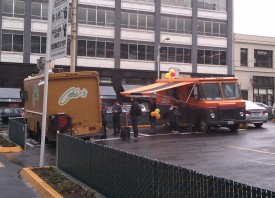Update 7/21: The City Council passed the proposed changes to street food regulations on Monday.
I’ve spilled my fair share of ink here singing food carts’ praises. It hasn’t just been idle chatter; right now the City of Seattle has the opportunity to take one more small step toward making sustainability legal with one giant leap for street food.
First, let’s review why food carts help to make a sustainable city:
- They’re good for density: Street food is a cross-culture hallmark of major urban areas, and for good reason: people like it. Plus, carts improve walkability by providing affordable eating options nearly anywhere. In short, food carts make cities attractive, which deters sprawl.
- They’re good for the community: Food is a uniter, not a divider. Carts are a great place to meet your neighbors (picnic-style!) and establish neighborhood identity.
- They’re good for the economy: The cost of opening and operating a food cart is a fraction of the enormous expense of running a brick-and-mortar restaurant. Carts are particularly empowering for first- and second-generation immigrants, providing them with opportunities to start a small, agile, low-overhead business.
To find a flourishing food cart scene, one need only to look to Portland to see hundreds of carts operating across a vibrant city. Portland’s downtown is dotted with clusters of carts servicing the business-lunch scene. It’s even been named the best street food city in the world.
Yet in Seattle, carts are few and far between. Part of the problem lies in what you are allowed to vend: the rules dictate that you either operate a food cart that sells a very limited set of items, or a full-scale food truck that’s significantly more expensive to own and must meet nearly the same requirements of a restaurant kitchen. Cumbersome and outdated regulations like these have largely kept food carts out of the city—the result of a city-wide crackdown on street vending of all kinds in the 80s. (I’m not saying we shouldn’t hold food carts to strict safety standards, but the existing regulations are overkill.)
But just yesterday, Seattle’s City Council Committee on the Built Environment passed out of committee proposed ordinances introduced a few months back. The proposal makes sweeping changes to the regulatory system surrounding mobile food vending. It shifts safety regulations from overly-prescriptive (you can only sell coffee, popcorn, and hotdogs) to more encouraging and realistic (you need to demonstrate that you can prepare food to certain safety standards). They also create better guidelines for where carts can operate in public areas. On Monday, the full City Council will make a decision on the regulations.
Are they perfect? Not by a long shot. They’re still overly cautious in designating where carts can operate, and the city seems bent on preventing Portlandesque “pods” by requiring them to head to what’s called a “commissary kitchen” (a rented brick-and-mortar space for food prep) once a day and limiting the number of trucks to two per city block.
But it’s a step in the right direction. To its credit, the council has largely bucked requests from restaurant owners to severely limit the location of carts. And city officials worked with cart owners to empower them to find locations and decide what they vend. By and large, the proposal would start to undo some of the damage done in the 80s, and could be the first steps toward a welcoming environment for street food.
Sightline’s Making Sustainability Legal project identifies specific regulatory barriers to affordable, green solutions. If you’ve come across such an obstacle, please let us know by writing Eric (at) Sightline (dot) org.









Bill Bradburd
Hopefully this is more about breaking the lock that commercial property and corporate interests have on how our neighborhoods are shaped and how our city functions.
Along with relaxing rules for home businesses (pending) and our urban agriculture/products rules, we should begin seeing the emergence of more functional and walkable neighborhoods that are human-scaled and that energize a local economy. Coupled with the affect of getting communities re-knitted together because of mutual self-interest, we hopefully will see a shift away from dependence on “outside” corporate entities for our daily life needs.
Commercial property interests will fight these moves, as will those saddled with obligations to that world like most restaurants are today.
But if we are to move to more sustainable living patterns, these changes are necessary.